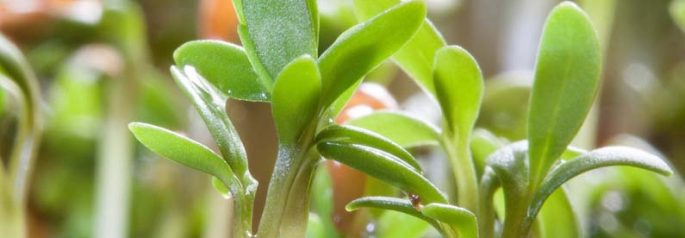
Dear John,
What’s your opinion of sprouts? I’ve heard mixed things about alfalfa sprouts. Do you eat them? Are some sprouts better than others?
David
Dear David,
Thanks for your question.
In the last few years, raw commercially grown sprouts have increasingly been recognized as a source of food-borne illness in the United States. After numerous outbreaks of Salmonella and E. coli infections, the California Department of Health Services issued a statewide advisory about the potential risk of illness from sprouts, particularly in children, the elderly, and those with compromised immune function. Recent reports have found toxic parasites including Cryptosporidium and Giardia in some commercially sold sprouts. As a result, many commercial sprout companies now rinse their sprouts with chlorine washes.
This concerns me. I tend not to buy commercial sprouts, and I particularly avoid sprouts sold in open containers, and also foods sold in restaurants that contain sprouts. I adamantly steer clear of sprouts kept under bright lights in restaurant salad bars.
In our home, however, we make our own sprouts. This has many advantages compared to purchasing them:
- It’s far less expensive.
- We are able to eat the sprouts at their peak of freshness.
- We make fewer trips to the store.
- It’s fun, particularly if kids get involved.
- We know the seeds used are organic.
- We know the sprouts aren’t contaminated.
- We know no chlorine has been used.
You mentioned alfalfa sprouts. I rarely eat them, because they contain an amino acid called canavanine, which is a natural toxin. In excess, it causes a chronic inflammatory disease similar to lupus. The concentrations of canavanine found in alfalfa seeds are greatly increased in alfalfa sprouts, which might be a natural defense to prevent animals from eating them.
Because of these and other toxins, Dr. Andrew Weil says that he does not eat raw alfalfa sprouts, lentil sprouts, or mung bean sprouts. My feeling is that for most people occasional consumption of small amounts of these sprouts is probably fine, although for those who are susceptible to autoimmune diseases, it may be best to avoid them entirely.
On the other hand, there is a particular type of sprout which seems to have many advantages. Broccoli sprouts contain extremely high concentrations of a helpful enzyme called sulforaphane. Sulforaphane was discovered in broccoli in 1992 by Paul Talalay, M.D., of Johns Hopkins University. Because concentrations of sulforaphane and other cancer-fighting substances are from 20 to 50 times higher in three-day-old broccoli sprouts than in mature plants, Talalay says that “small quantities of broccoli sprouts may protect against the risk of cancer as effectively as much larger quantities of mature vegetables of the same variety.” Broccoli sprouts, he believes, “offer a simple dietary means of reducing cancer risk.”
Talalay founded the Brassica Chemoprotection Laboratory at Johns Hopkins, which may be the only medical school department in the world devoted to a particular vegetable. This brings to mind Thomas Edison’s prediction: “The doctor of the future will give no medicine; but instead will interest his patients in the care of the human frame; in diet; and in the causes and prevention of disease.”
Broccoli sprouts don’t taste like broccoli, by the way. They taste (and look) more like alfalfa sprouts. They detoxify carcinogens and protect against chemically induced cancers. They also contain significant amounts of selenium, a mineral that is sometimes low in vegan diets, particularly in England. (Brazil nuts are another good source of selenium.)
Not all broccoli varieties are equally beneficial when sprouted. Some are far higher than others in sulforaphane and other protective substances. Seeds that carry the Brassica Protection Products Seal have been designated by Johns Hopkins University to have the highest levels of sulforaphane and other anti-cancer compounds. One source for such seeds is Caudill Seed Company (800-626-5357). They sell a pound of organically grown seeds (enough to make many gallons of sprouts) for $10 (plus shipping).
To make sprouts you soak the seeks overnight. Then you rinse and drain them two or three times a day. After a few days, voila, you have sprouts. You can eat them then, or store them for a few days in the refrigerator. For about four dollars you can get a set of Sprout-Ease Econo-Sprouter Toppers (830-257-6020) which screw onto wide-mouthed canning jars.
In our home, we also sprout hulled sunflower seeds, eating them 36 hours after they are first soaked.
Yours for healthy people and a healthy planet,
John

